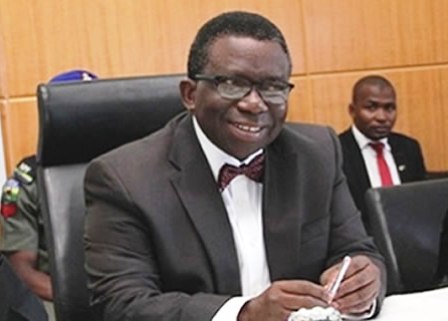-
FG convenes Emergency National Council on Health Meeting

Health Minister
ABUJA – The Federal Government on Monday, February 5, said Lassa fever virus had killed 31 people in the country this year.
Addressing Commissioners of Health, heads of health agencies, heads of military and paramilitary health departments and other stakeholders in Abuja, Minister of Health, Prof. Adewole Isaac, said the disease was taking a dimension that had not been witnessed in the country.
He said the disease had been active in 15 states in the country with 105 laboratory confirmed cases this year.
The minister challenged research institutions, including the Nigerian Institute of Medical Research (NIMR) and Nigerian Institute for Pharmaceutical Research and Development (NIPRD) among others to come up with studies on the viral disease.
Adewole said 2017 had the worst of confirmed cases of the disease in the country, with 405 suspected cases.
“My challenge again with NIMR and our research institutes is that they need to look at the changing dynamic of Lassa fever. Lassa fever outbreaks only do occur during dry season, but now, we are contending with an all-year transmission of Lassa fever.
“NIMR, NIPRID, the other research institutes, we need to find out, are we dealing with a new strain of Lassa fever? We are also worried about the case fatality. What is also worrisome is the occurrence of viral haemoharrgic fever among health care workers.
“When health care workers are affected, then, there is a challenge because every person that came in contact with that health care worker is at risk,” he said.
Lassa fever has affected 10 health care workers in 2018, killing four of them, Adewole said.
At the meeting, which had the theme “State of Public Health in Nigeria,” the minister said the country had witnessed outbreaks of eight infectious diseases in recent time.
The diseases are Ebola, polio, measles, cholera, Yellow fever, Monkey pox, Lassa fever and meningitis.
He expressed displeasure with the manner some Health Commissioners manage health information in their states by failing to report to their principals (governors) the reality of health issues in their territories.
The minister also noted that Edo state had made good contributions towards fighting not only Lassa fever, but in putting in place health infrastructures that would boost health care delivery.
He also blamed Ondo state government for being ‘quiet’ and ‘in fact sleeping,’ over the spread of the disease in its territory.
He went on: “We need to increase our level of awareness. We need to be more focused with respect of diagnosis of Lassa fever. I challenge our colleagues who want to treat malaria in these days and age with diagnosis. The era of treating malaria without diagnosis is over…
“There is nothing like malaria/typhoid fever; there is nothing like it. It shows confusion. What many of our colleagues do is to make diagnosis on malaria/typhoid fever. And, they do combined anti-malaria and antibiotic…”
In Lassa fever, “Edo is a lead state, and then, Edo is also a point of attraction. People deliberately go there. Some of the cases attributed to Edo might be due to cases from other states.
“But, when you look at the level, actually from my record, Ondo is top, although the last information I got from the NCDC is that Edo has more cases from Ondo. But, this year, Ondo has more cases. Ondo has been quiet, in fact sleeping. And, then, we have Bauchi, Taraba, Plateau, Ebonyi, Nasarawa, Oyo, Lagos, Kaduna, Kano.
“And, then, when you look at confirmed cases with respect to deaths, we also look at the case fatality. Ebonyi has the worst case facility. We’ll also be discussing this, 42 percent. But, seven of the cases in Ebonyi were traced to one individual surgical proceeding. Last year, we had our case, but, we cannot celebrate this year.
During an interview with newsmen, Commissioner for Health, Ondo State, Dr Wahab Adegbenro, said his state had given its best to preventing Lassa fever and ensuring prompt medical attention for people affected by the disease.
He said cases being experienced in the state were from border communities with neighbouring states affected by the virus.
Adegbenro pledged that the state government would continue to ensure quality health care for people of the state by committing adequate resources and improving the quality of health infrastructures in the state.
Meanwhile, Country Representative, World Health Organization, WHO: Wondi Alemu said at the meeting that “Nigeria has started with yet another outbreak that calls attention of everybody. Lassa fever is not new, but this year, we have more tragedies with the passing away of our colleagues and workers while attending to patients.”
He said the deaths had helped medical workers realize that they must protect themselves before attending to patients.
“Yes, as health workers we might be obliged not observing the basic protective measures, and that is rescuing our lives. Ultimately, it is about having those protective equipment all the time at the facility level. It should be part and parcel of the operation of health care for everybody. We believe that next time, this will be avoided. We can’t keep sacrificing our health workers because some basic protective kits are not available.
“On the level of preparedness, I have to mention that this time, I have seen much more change in the last 14 months that I’m here in terms of quickly responding and promptly sharing information with the international community as well as partners here in the country,” he stated

